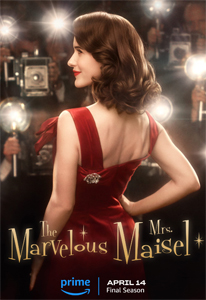Like the final season of “Lost,” “The Marvelous Mrs. Maisel” is flash-forwarding in its last go-around, in the prologs of each episode (three of which have aired on Amazon Prime). Reflecting the parenting styles of the midcentury (decidedly not a “helicopter parent” era), Midge (Rachel Brosnahan) sometimes seems like she forgets she has two children.
But on the other hand, Amy Sherman-Palladino and Daniel Palladino’s most famous show is “Gilmore Girls,” in which both Lorelia and Rory are very much shaped by their parents. It’s intriguing to look ahead to the Eighties and see how Esther and Ethan turned out.
It’s like they skipped a generation’s influence: Esther (Alexandra Socha, perfectly parroting Brosnahan’s rhythms) is a neurotic, brilliant scientist (taking after grandfather Abe). Ethan (Ben Rosenfield) leads a religious commune in Israel (taking after Joel’s parents).
“The Marvelous Mrs. Maisel” Season 5 (2023)
Fridays, Amazon Prime (three of the nine episodes have aired)
Creator: Amy-Sherman Palladino
Stars: Rachel Brosnahan, Alex Borstein, Tony Shalhoub
Can Midge have it all?
If “Lost” isn’t a weird enough comparison, here’s another: “Better Call Saul.” As with the time-jumping drama that wrapped last year, we peer into a darker future for Midge (Brosnahan in understated makeup and prosthetics to age her). She was an A-list comedienne throughout the Sixties and Seventies. Revealing this in a flash-forward is, strictly speaking, an extreme anti-climax, if “Maisel” has been about the question of whether or not Midge will find success.
But it’s not an insane storytelling choice. Honestly, we know Midge is gonna be a success, right? And we don’t want to keep cycling through ups and downs (although her first day on “The Gordon Ford Show” is a pitch-perfect portrayal of imperfect pitches and confusion about the writers’ room structure).
Now “Maisel” becomes about what Midge loses in choosing career over family. In addition to “losing” her kids, her romantic relationships have all ended in breakups. Teased possible pairings with Sylvio (Milo Ventimiglia) and Gordon Ford (Reid Scott) acquire the same bittersweet tinge as that with Lenny Bruce (Luke Kirby), who died in 1966 in real life. (The “present day” of “Maisel” Season 5 is 1961.)
Still – if we view the Eighties scenes with the same faint hope as “Saul’s” flash-forwards — maybe she’ll find love with Joel (Michael Zegen) or another of her exes in the Eighties. In 1961, Joel himself is dealt a blow by the “can’t have it all” syndrome: Mei (Stephanie Hsu) breaks up with him – and has an illegal abortion, although the word is carefully unsaid — to pursue her medical career.

Might as well laugh about it
As dark as “Maisel” can get, it’s hard to imagine this colorful show ending on a sour note. It hasn’t forgotten the comedy in Season 5, although we do see the Palladinos and their writers’ room straining to write failed jokes (for the “Gordon Ford” writers’ room) along with OK jokes along with great jokes.
As has always been a problem with this series, what’s funny and what isn’t (to Sixties stand-up comedy audiences) is random. Really, is that joke about the voice of Bugs Bunny being targeted by the voice of Elmer Fudd worthy of a laugh, or a groan? Arguably, neither; it’s quite flat for a centerpiece joke. But Brosnahan’s likability always pulls us through.
As for the broader set-ups, Season 5 has a higher percentage of misses than in the past. Rose’s (Marin Hinkle) ongoing rivalry with the established mob of NYC matchmakers is a good premise, but it’s backgrounded, with a lot happening off-screen (although it’s always nice to see Kelly Bishop, here as the imprisoned mob boss).
Shalhoub shines
Ethan’s inability to sleep in his own bed isn’t engrossing, either. But it does lead to a showcase for the actor who always stands out amid this stellar cast: Tony Shalhoub as Abe. He’s awesome in delivering to young Ethan a monolog about fear. The ostensible goal is to buck up the child, but – with delightful obliviousness — Abe scars him with horror stories about the terrifying nature of existence.
Even funnier is Abe’s “love triangle,” wherein a woman he is interviewing for his arts column puts her hand on his thigh, causing his brain to short circuit so he rambles about wallets. He needs clarification from his editor that this was a romantic move by the woman, then he acts flustered around Rose, fiddling with a jar of pickles.
This is a lighter twist on how Pennilyn Lott briefly comes between Richard and Emily. I hope “Maisel” continues to mine it for LOL sequences, serving up more BP fastballs to Shalhoub.
Sparing no expense
Other things we can trust “Maisel” with are set design and choreography. Midge and Lenny chat in a red pastel jetway, and indeed, the entire airport looks like how the future looked in the Sixties. Brosnahan and Ventimiglia do a masterfully choreographed chase-and-dodge through a subway system insanely loaded with period-accurate extras. Sherman-Palladino can’t do as many “Bunheads”-esque dance numbers as she’d like, but that doesn’t stop her from going big.
Sometimes “Maisel’s” staginess is apparent – lending it the slightest community-theater vibe — but I’d hate to discourage the big swings. I feared the outdoor ice-rink sequence would be a step too far, but it includes the delightful surprise that Alex Borstein (as Susie) is a helluva skater!
Ultimately, despite Abe’s speech to Ethan, I have little reason to fear anything will go wrong with Season 5. Sure, “Better Call Saul” ended too bitterly for my taste. But – after a pleasant wade through laughs and spectacle – by the time of the conclusive episode, I’ll almost certainly be applauding “The Marvelous Mrs. Maisel.”
Top 250 trivia
- “The Marvelous Mrs. Maisel” ranks at No. 107 among IMDB’s top 250 TV shows, with an 8.7 rating. It’s down only slightly from when I reviewed the first episodes of Season 4. It was at No. 90 back then.
Click here to visit our “Gilmore Girls,” “Bunheads” and “Marvelous Mrs. Maisel” Zone.

